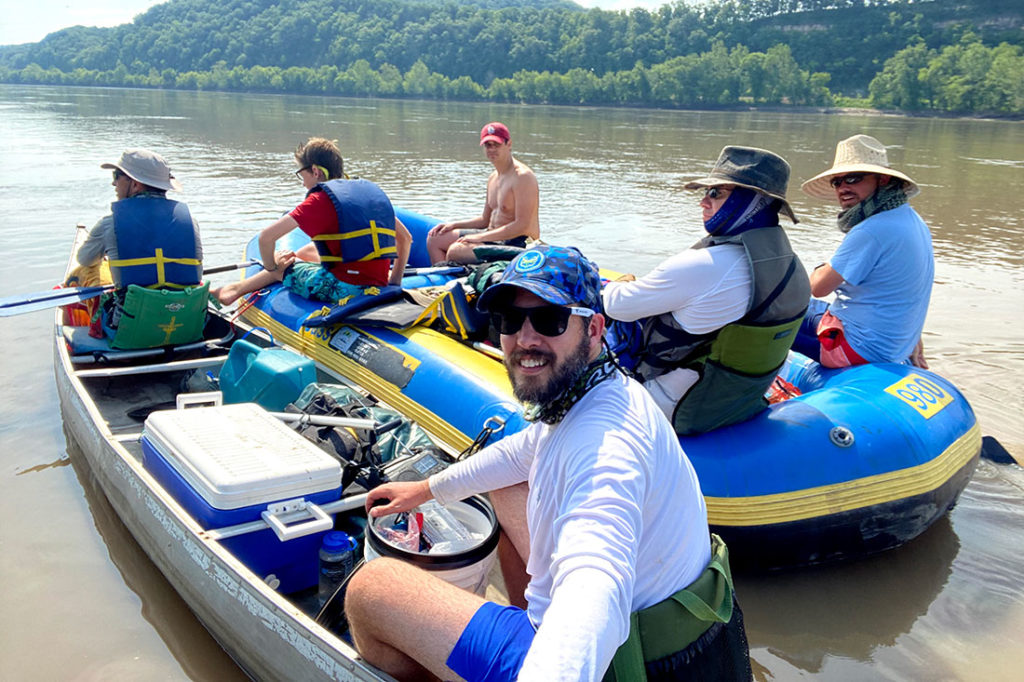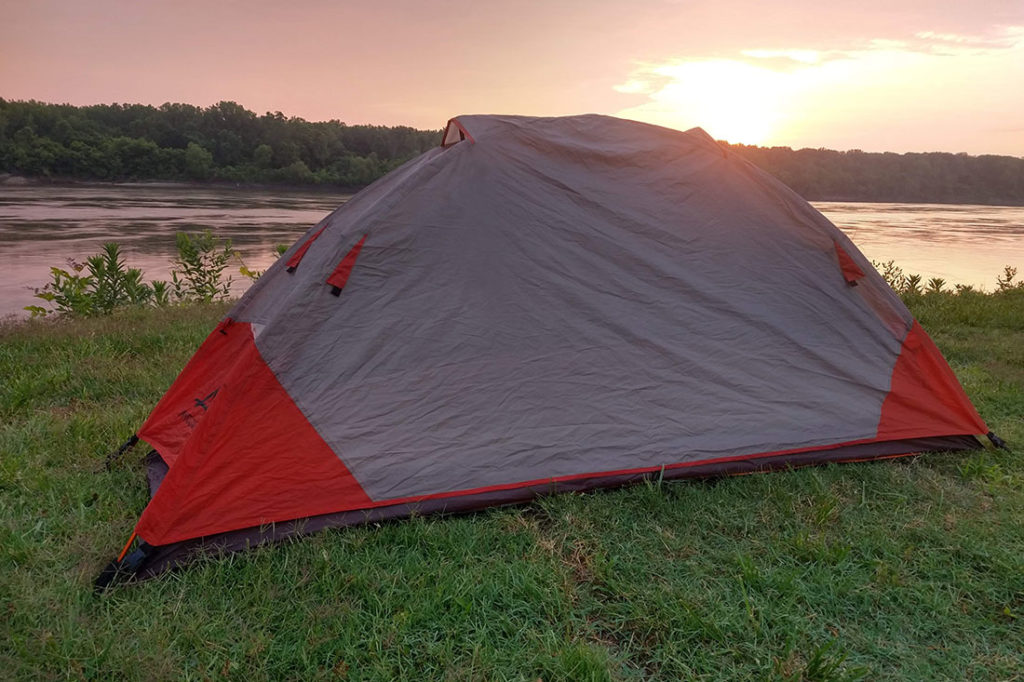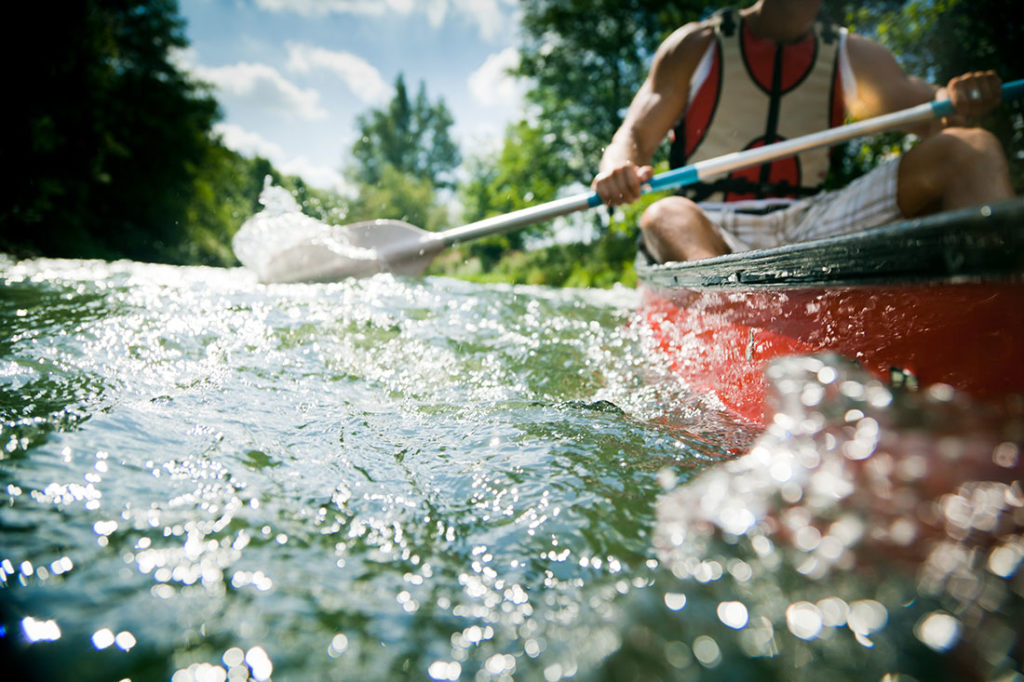The sandbar island stretched 30 yards wide and 100 yards long. Soft to the touch, it sat in the middle of the Missouri River, half a day’s paddle from the Missouri state capitol of Jefferson City. As I snacked on carrots on that island one day in June, the stifling summer heat cooked my outside and anxiety cooked my insides.
Five friends and I were only a few hours into a three-day, two-night canoe trip, and the worries that pricked at me as I plotted out the adventure now roared inside me: I had no idea where we would sleep that night. I had not known what time we would get on the river, what the weather would be like, or how fast we would go. That meant I could not determine where we would camp the first night. Because I did not know where we would sleep the first night, I also did not know where we would sleep the second night.
In my whole life, I can’t remember a single day in which I woke up not knowing where I would sleep that night. And now I was going to do it two nights in a row with five friends? What was I thinking?
For two nights, I would rely on the whims of the river. This is not how I usually roll, and I assumed it wasn’t how my friends who were with me rolled, either. A few weeks before the trip, I sent an email to them confessing I did not know where we could sleep. I expected much complaining, maybe even someone backing out. None of them cared.
And now, as we ate lunch on the sandbar island the first day, with no idea where we would lay our weary heads that night, they still didn’t care.
I did.
I hated it.

***
Letting go of knowing where I would sleep for two nights was one of many examples in this lost coronavirus summer of giving up control. Solopreneurs, especially, have had to fight against forces far outside of their control since mid-March.
Now, to be clear: I know, deep down, that I’m not in control of anything. Not my work, not my health, not my family, not anything. I know, always, at any moment, any or all of that could come crashing down on me. But the illusion of control comforts me, gives me agency in a world in which we all too often lack it, especially lately. Since the shutdown started, I’ve learned I’m not in control so many times you’d think I’d know it already and I’d stop having to learn it.
But, nope.
Wrestling for control has been going on for my whole professional life. Yours, too, right? We become solopreneurs to seize control from bosses/jobs/both we don’t like only to discover we can’t control everything on our own, either.
I like to think that at least sometimes, my control freak tendencies manifest themselves in subtle, even healthy ways. Before negotiating a story fee, for example, I rehearse possible scenarios. If I’m prepared for a situation, I can control it, or at least control my reactions. This is made easier by the fact I usually have a fairly good idea of what an offer is going to be and therefore the range of my possible reactions is pretty narrow.
One time, my “fairly good idea” turned out to be completely wrong. I was dealing with the second editor on a piece after having talked loosely about a price but not settling on a final number with the first editor. I had already all but agreed to write the piece without knowing what I could be paid, a mistake I haven’t repeated. The offer from the second editor was insultingly low. Before my brain could control my mouth, I blurted out, “There’s no way in the world I would do it for that little.”
I said it with anger. I would have never done that “on purpose.” There was a brief pause on the other end of the line. Oh, crap, I thought, or maybe something more colorful, I just torched this bridge. But the editor took my blurted-out reply the right way. He asked how much I wanted. I asked for more than double his offer. He said yes.
***
If the consequence of letting go of control in that case was that I learned that an emotionally authentic, “in-the-moment” reaction can be valuable, the consequence of not knowing where I was going to sleep that night in June was powerful anxiety.
For much of the morning and afternoon, I kept an eye on the shore, looking for suitable places to camp. My thought was, if I saw a few good spots now, I would see a few later. I did not see any now. Or later.
Late afternoon, we arrived at Tate Island Conservation Area, comprising three islands on the north side of the river. My anxiety washed away as we pulled up to it.
My friend Andy stepped out of the canoe, planted his sandaled foot on the ground, and his leg disappeared up to his knee. He almost couldn’t pull his foot out of the mud, and when he did, part of his sandal was no longer there. We could not land our boats there, never mind sleep there.
For the next hour-plus, every place we stopped was a muddy, impassable, uncampable mess.
Just as my anxiety pegged—what kind of nimrod plans a trip for five friends without knowing where they’ll sleep?—a usable, if also far from perfect, place to camp presented itself. I hesitate to call it a site, as that would suggest others had stayed there before.
My one-man tent has a footprint of 7.5 feet by 2.67 feet, and there were no clearings that big. I crammed it into a patch full of brush, and it wasn’t until afterward that someone pointed out the brush contained poison ivy. I had no allergic reaction to it, thank goodness, though I’m 99% sure I stepped in it.
The second day brought the same tension as the first. Eager to avoid another mud delay, we started looking early for a place to camp and soon found a boat landing. We climbed a short incline to discover a city park with a free campground, which was unmentioned in guidebooks I had read.
It was perfect. And it wasn’t the place that made this night memorable, or at least it wasn’t only the place. For the next several hours we giggled through a parade of encounters with local characters and “you-had-to-be-there” moments we’ll be talking about for the rest of our lives.
There was Dirty Baby Guy, who let his infant son play in the dirt at a river overlook, then borrowed wipes from us to clean him up before taking him home to his wife. There was the joyful discovery of free showers in a building a block from the park. There was a baffling and entertaining and profane conversation with a local glass blower that ended with him gifting an intricate globe to a 12-year-old boy who was part of our merry band of paddlers.
As I climbed into my tent, the hilarious evening had already redeemed the anxiety that preceded it. I knew that the next time I faced a loss of control similar to not knowing where I’ll sleep that I’ll tackle that problem with just a little bit more been-there, done-that confidence. Indeed, a few weeks after this trip, I took another canoe trip, this time with specific plans of which site to sleep on… only to arrive there and find someone else had already claimed my spot… and the next four after that. I found that more funny than stressful.

***
On the banks of the Missouri River, I woke up first. I sipped coffee and watched the rising sun paint the sky behind the river purple, pink and orange. Soon everyone slipped out of their tents and joined me. We ate instant oatmeal and laughed again at all that happened the night before.
We marveled anew at how precise the globe was. On the inside of it, our new friend inscribed a message: “Let the river lead you.”
That was genuine and heartfelt, even if as life advice it’s gibberish, for anyone and especially a control freak. Rivers hide danger just under the surface and go hurtling over waterfalls and get dammed.
Then again, I let the river lead us for two nights, and it worked out pretty good.
Read next: How the Pursuit of Lifelong Goals Can Change Your Life
Photo by nullplus/Shutterstock.com





